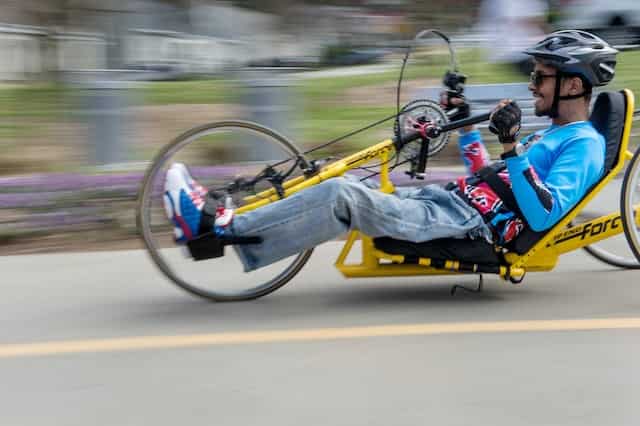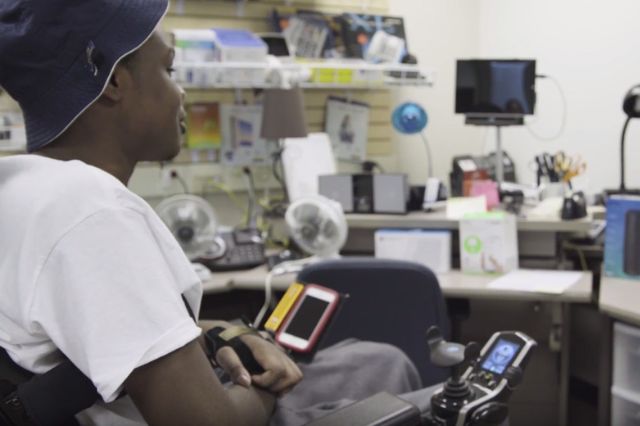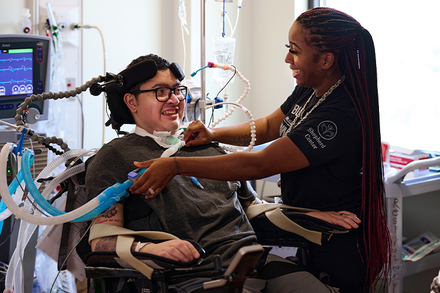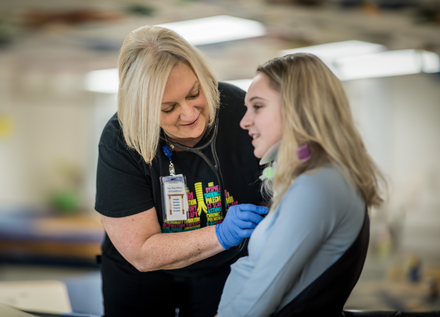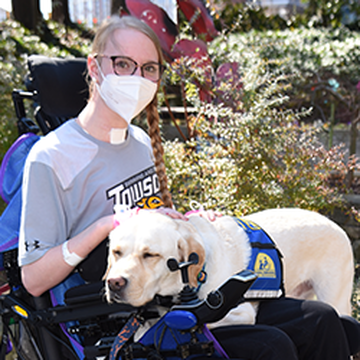Respiratory Services at Shepherd Center
From intensive inpatient support to personalized outpatient services, we're committed to enhancing your respiratory health so you can breathe easily again
When you face a spinal cord or brain injury, control over a crucial breathing muscle known as the diaphragm may be affected. Your ability to breathe independently, a function we take for granted, can be profoundly impacted. This significant change can be overwhelming, not just for you but for your supporter and caregiver.
At Shepherd Center, a top-ranked neurorehabilitation hospital, our respiratory therapists are compassionate partners in your comprehensive care, staying alongside you throughout your recovery journey. From the moment you arrive, our dedicated respiratory therapy team is here for you 24/7, providing unwavering support and care.
With a rich history and proven track record of guiding people through the complexities of ventilator weaning, we take a proactive approach to your recovery, customizing our therapies to make breathing easier and more effective while enhancing your overall well-being, strength, and independence.
Our Respiratory Services
Our Approach to Respiratory Therapy
Respiratory Assessment
Our team of respiratory experts are here to understand your unique needs, considering factors such as the severity of airway secretions and cognitive condition. The treatment process begins with a comprehensive respiratory assessment. This may involve reviewing your medical history, checking out how you breathe, and looking at the respiratory devices currently being used.
Respiratory Care
After the assessment, we’ll guide you through a tailored treatment plan, blending respiratory therapy with intense rehabilitation sessions, covering physical, speech, and occupational therapy. We’ll keep a close eye on things, regularly checking in with you to adjust the plan based on how things are going. If necessary, we may use specific respiratory devices like CPAPs, BiPAPs, Nebulizers, inhalers, the MetaNeb® System, tracheostomy, ventilators, or diaphragmatic pacemakers.
Respiratory Education
As we navigate this journey together, our role extends beyond providing treatment – we are also committed to providing you with the knowledge and skills to confidently care for your loved one upon returning home. Our Respiratory Therapy Educator will serve as your guide, offering insights on maintaining a healthy respiratory lifestyle, managing respiratory devices, and recognizing the early signs of respiratory distress.
A Team Approach to Your Care
At Shepherd Center, we understand that complex respiratory challenges require extraordinary care to achieve the best possible outcomes. That’s why we take a multidisciplinary approach, collaborating closely with pulmonologists, respiratory therapists, nurses, speech therapists. physical therapists, occupational therapists, and other specialists to provide the highest standard of care. Together, we combine our expertise and experience to deliver coordinated and innovative care options to maximize recovery, foster healing, and enhance your loved one’s overall quality of life.
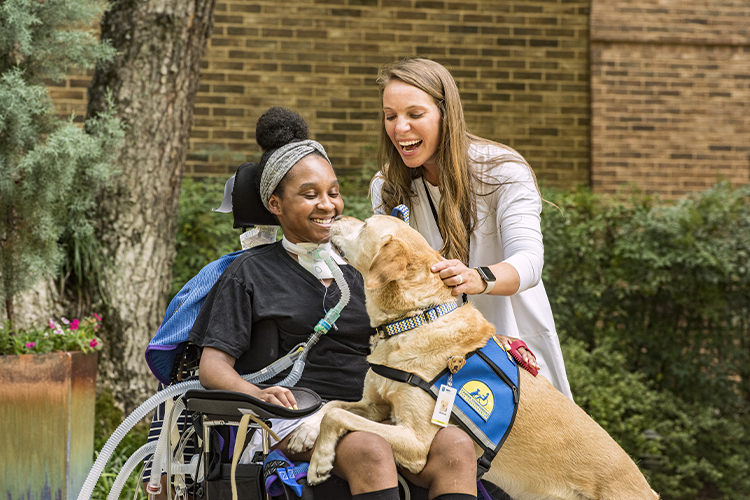
Patient TestimonialAs soon as I got off the vent and the trach, I could ramp up to doing more so much quicker. Doing rehab the entire time really made me feel like I was working toward something, that I had a role to play in getting better.
Reagan MartinC4 Spinal Cord Injury
Frequently Asked Questions
Significant injuries to the spine or brain can often disrupt the body’s control over a vital breathing muscle called the diaphragm, affecting our ability to breathe independently. Respiratory therapy focuses on clearing airway secretions, ensuring the entire breathing system – airways, lungs, and blood vessels – is doing its job properly.
Prolonged lack of movement after a traumatic injury can hurt recovery, leading to a loss of muscle strength, joint stiffness, and complications with breathing. Early and active rehabilitation helps counter the negative effects of immobility, contributing to improved outcomes and a more fulfilling life after injury. With the support of an onsite intensive care unit (ICU) and dedicated respiratory care team, we can admit your loved one directly from an acute care setting, initiating the inpatient rehabilitation and healing process sooner – even if they still rely on a ventilator or tracheostomy to breathe.
At Shepherd Center, our respiratory therapists use a variety of treatments to address respiratory issues, clear airway secretions, and improve lung function. Some common respiratory treatments may include:
- Mechanical ventilation
- Tracheostomy care
- Ventilator weaning
- Diaphragmatic pacemaker
- Breathing exercises
- Utilization of respiratory devices such as CPAPs, BiPAPs, and high-flow oxygen
- Inhalation therapy, including nebulizers, inhalers, and the MetaNeb® System
Your dedicated care team will tailor your treatment approach, ensuring it aligns with your unique respiratory needs.
Yes! Our care team includes a Respiratory Therapy Educator who is here to provide you with the knowledge and skills to feel confident about caring for your loved one at home.
Absolutely! At Shepherd Center, we know that dealing with complex respiratory challenges requires a team approach. Our respiratory therapists work closely with pulmonologists, nurses, speech therapists, physical therapists, occupational therapists, and other specialists. Together, we coordinate innovative care options to maximize recovery, foster healing, and improve overall quality of life.
If you're an inpatient requiring respiratory care, a respiratory therapist will be assigned to you as soon as you’re admitted. For those looking for outpatient respiratory therapy services, please contact our respiratory care team.
Contact Shepherd Center's Respiratory Services
Questions about trach changes, diaphragmatic pacemaker programming, vent weaning, or other respiratory services? We're here to help.

